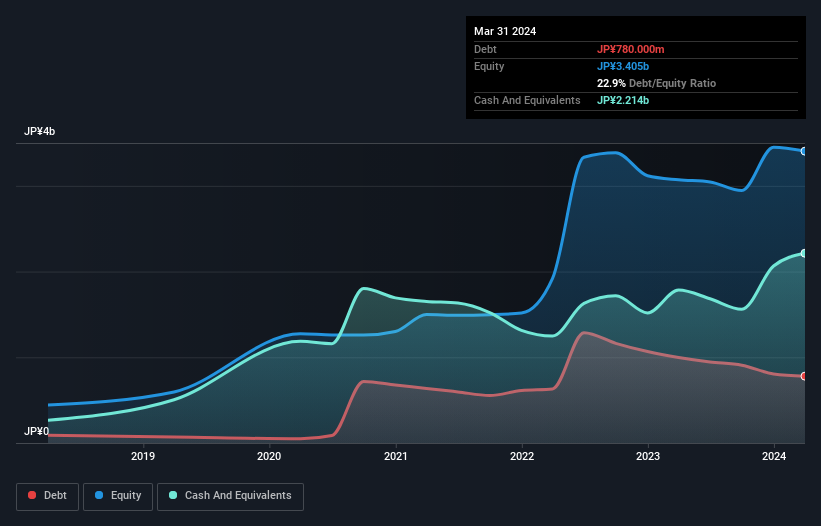Legendary fund manager Li Lu (who Charlie Munger backed) once said, 'The biggest investment risk is not the volatility of prices, but whether you will suffer a permanent loss of capital.' So it might be obvious that you need to consider debt, when you think about how risky any given stock is, because too much debt can sink a company. We note that INCLUSIVE Inc. (TSE:7078) does have debt on its balance sheet. But the more important question is: how much risk is that debt creating?
When Is Debt Dangerous?
Debt and other liabilities become risky for a business when it cannot easily fulfill those obligations, either with free cash flow or by raising capital at an attractive price. In the worst case scenario, a company can go bankrupt if it cannot pay its creditors. However, a more usual (but still expensive) situation is where a company must dilute shareholders at a cheap share price simply to get debt under control. By replacing dilution, though, debt can be an extremely good tool for businesses that need capital to invest in growth at high rates of return. When we examine debt levels, we first consider both cash and debt levels, together.
View our latest analysis for INCLUSIVE
How Much Debt Does INCLUSIVE Carry?
As you can see below, INCLUSIVE had JP¥780.0m of debt at March 2024, down from JP¥998.0m a year prior. But it also has JP¥2.21b in cash to offset that, meaning it has JP¥1.43b net cash.

A Look At INCLUSIVE's Liabilities
Zooming in on the latest balance sheet data, we can see that INCLUSIVE had liabilities of JP¥942.0m due within 12 months and liabilities of JP¥957.0m due beyond that. On the other hand, it had cash of JP¥2.21b and JP¥471.0m worth of receivables due within a year. So it actually has JP¥786.0m more liquid assets than total liabilities.
This short term liquidity is a sign that INCLUSIVE could probably pay off its debt with ease, as its balance sheet is far from stretched. Simply put, the fact that INCLUSIVE has more cash than debt is arguably a good indication that it can manage its debt safely. When analysing debt levels, the balance sheet is the obvious place to start. But you can't view debt in total isolation; since INCLUSIVE will need earnings to service that debt. So if you're keen to discover more about its earnings, it might be worth checking out this graph of its long term earnings trend.
In the last year INCLUSIVE wasn't profitable at an EBIT level, but managed to grow its revenue by 12%, to JP¥5.4b. We usually like to see faster growth from unprofitable companies, but each to their own.
So How Risky Is INCLUSIVE?
Although INCLUSIVE had an earnings before interest and tax (EBIT) loss over the last twelve months, it made a statutory profit of JP¥313m. So taking that on face value, and considering the cash, we don't think its very risky in the near term. We'll feel more comfortable with the stock once EBIT is positive, given the lacklustre revenue growth. When analysing debt levels, the balance sheet is the obvious place to start. But ultimately, every company can contain risks that exist outside of the balance sheet. For example - INCLUSIVE has 3 warning signs we think you should be aware of.
If, after all that, you're more interested in a fast growing company with a rock-solid balance sheet, then check out our list of net cash growth stocks without delay.
New: AI Stock Screener & Alerts
Our new AI Stock Screener scans the market every day to uncover opportunities.
• Dividend Powerhouses (3%+ Yield)
• Undervalued Small Caps with Insider Buying
• High growth Tech and AI Companies
Or build your own from over 50 metrics.
Have feedback on this article? Concerned about the content? Get in touch with us directly. Alternatively, email editorial-team (at) simplywallst.com.
This article by Simply Wall St is general in nature. We provide commentary based on historical data and analyst forecasts only using an unbiased methodology and our articles are not intended to be financial advice. It does not constitute a recommendation to buy or sell any stock, and does not take account of your objectives, or your financial situation. We aim to bring you long-term focused analysis driven by fundamental data. Note that our analysis may not factor in the latest price-sensitive company announcements or qualitative material. Simply Wall St has no position in any stocks mentioned.
Have feedback on this article? Concerned about the content? Get in touch with us directly. Alternatively, email editorial-team@simplywallst.com
About TSE:7078
INCLUSIVE Holdings
Engages in web media operation and monetization support services in Japan.
Flawless balance sheet and slightly overvalued.
Market Insights
Weekly Picks

THE KINGDOM OF BROWN GOODS: WHY MGPI IS BEING CRUSHED BY INVENTORY & PRIMED FOR RESURRECTION


Why Vertical Aerospace (NYSE: EVTL) is Worth Possibly Over 13x its Current Price


The Quiet Giant That Became AI’s Power Grid
Recently Updated Narratives

Rocket Lab USA Will Ignite a 30% Revenue Growth Journey


Dollar general to grow


Mastersystem Infotama will achieve 18.9% revenue growth as fair value hits IDR1,650
Popular Narratives


MicroVision will explode future revenue by 380.37% with a vision towards success


NVDA: Expanding AI Demand Will Drive Major Data Center Investments Through 2026





